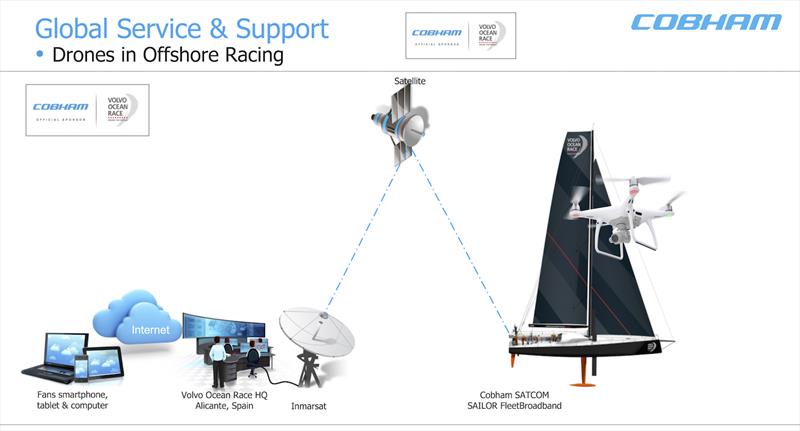
How do they do that?
by Louay Habib 7 Mar 2018 14:33 GMT

Volvo Ocean Race via Satellite schematic © Cobham SATCOM
For five editions of the Volvo Ocean Race, Louay Habib has been the travelling reporter for Cobham SATCOM the official Satellite & Radio Communications Equipment Sponsor. With its relationship with the Volvo Ocean Race stretching back to 2001, all of the satellite and radio communication systems on board the Volvo Ocean 65s, and used by the race management team, are provided by Cobham.
You can not help but admire the stunning media produced by the On Board Reporters (OBR) during the 2017-18 Volvo Ocean Race, capturing the imagination of millions of race fans. Understanding how the media gets off the boat and onto your phone, tablet or computer is often taken for granted. Since the first race in 1973, there has been a quantum leap in the design and speed of the boats, and that has been equally matched by the advancement in satellite communication systems.
The Volvo Ocean 65s are equipped with sophisticated communication systems. Allowing tracking of the fleet's position throughout the offshore legs, as well as instant communication with the crews through both video and audio channels. We are talking about tens of gigabytes of data coming off the boats deep in the world's oceans. So how do they do that?
Data such as audio, pictures and video are converted by interfacing with a smart box called a BDU (Below Deck Unit), which is then converted into radio waves by the antenna inside the dome. Just as you tune into a FM radio station by selecting the right frequency, the antenna transmits the radio waves on the L-Band, which has a very long wavelength and as such is not badly affected by rain, or the torrents of water streaming down the deck of a VO65.
These radio waves are transmitted 36,000 km out into space to Inmarsat's BGAN Satellite network. The satellite acts as a mirror in Space, bouncing data from one side of the earth to another, and onto a ground station, which then connects to the Volvo Ocean Race HQ in Alicante. The media team then use the world wide web to transmit the data to your communication device.
The theory of satellite communication, is fairly simple. However in practice, maritime satellite communication presents many additional problems. Land antennas are usually stationary, once it has locked onto the satellite then transmission is relatively straight forward, a VO65 hurtling through the ocean is far from stationary! The motion of the boat is through three plains. Pitch is the up/down rotation from port to starboard. Roll is the tilting rotation from bow to stern. Yaw is the rotation of the boat about its vertical axis. The Cobham SATCOM antennas on board the VO65, need to lock a signal with the satellite 36,000 km away in Space, and remain pointing at the satellite regardless of motion. The antennas need to deliver an incredible level of stabilisation through three axis.
Life at the Extreme is hard on man and machine, just take a look at one of the sailor's hands after three brutal weeks in the ocean – it is not a pretty sight. The satellite equipment doesn't enjoy a watch system, the domes are at the mercy of the elements 24-7. However, the hardware Cobham uses for the Volvo Ocean Race is standard, designed and built to operate in hurricane force winds, at 40 knots of boat speed, with an operational temperature range of -25 to +55°C.
For the 13th edition of the race, the company also supplies a wide range of safety equipment, built to be best in class. Each boat is extensively equipped with: Emergency Position Indicating Radio Beacons (EPIRB), Search and Rescue Transponders (SART), and hand held VHF radios along with aviation frequency emergency radios.
For more information about Cobham SATCOM visit www.cobham.com